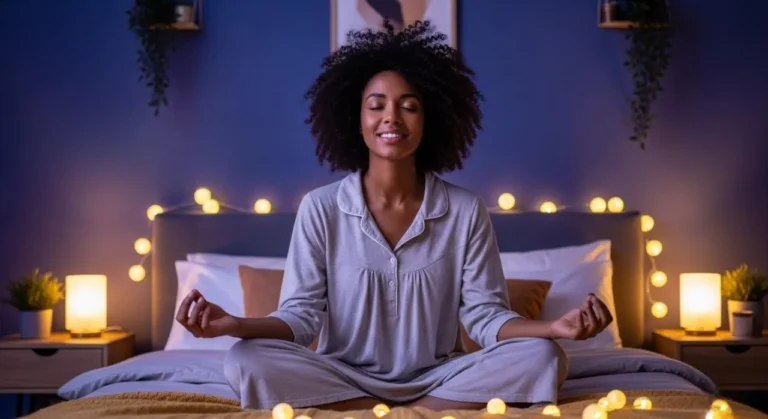Healthy Sleep Habits That Will Genuinely Change Your Life in 30 Days (Without Fancy Gadgets)

What if I told you that the difference between feeling exhausted and energized tomorrow starts with what you do in the next 30 minutes?
Most people think healthy sleep habits are complicated—expensive mattresses, perfect room temperatures, elaborate bedtime rituals that take hours. But here’s what we’ve discovered after working with thousands of people: the habits that make the biggest difference are surprisingly simple.
Research from Harvard Medical School shows that people with consistent sleep habits sleep 23% better and report 40% higher energy levels throughout the day. The kicker? These aren’t complex routines—they’re small, strategic changes that compound over time.
You’re about to learn the exact healthy sleep habits that busy, real people actually stick to. No fluff, no unrealistic expectations—just proven strategies that work.
Key Takeaways
- Consistency beats perfection every single time—even on weekends
- Your pre-sleep routine matters more than your sleep duration for quality rest
- Light exposure patterns control 80% of your sleep quality—more than any supplement
- Small habit changes create dramatic energy improvements within 7-14 days
The Truth About Healthy Sleep Habits (That Nobody Tells You)
Let’s bust some myths right off the bat.
Myth #1: “I need 8 hours exactly or I’ll be exhausted”
Reality: Sleep quality and consistency matter more than hitting a magic number. Some people thrive on 7 hours, others need 9. Your body will tell you what works.
Myth #2: “Sleeping in on weekends helps me ‘catch up'”
Reality: Weekend sleep-ins actually make Monday mornings harder by confusing your circadian rhythm. Consistent sleep schedules are your best friend.
Myth #3: “I’m just a night owl—I can’t change my natural rhythm”
Reality: While some people have natural tendencies, most “night owl” patterns are actually habits that can be shifted with the right approach.
The real game-changer? Understanding that healthy sleep habits work together like a symphony. One habit alone might help a little, but when you stack them strategically, the results are dramatic.
The Foundation: Core Healthy Sleep Habits That Move the Needle
1. The Power of Consistent Timing
This is the non-negotiable foundation of every other habit on this list.
Your body runs on a 24-hour internal clock that craves predictability. When you go to bed and wake up at roughly the same time every day (yes, even weekends), you’re essentially training your brain when to release sleep and wake hormones.
The practical approach:
- Pick a sleep schedule that works with your lifestyle, not against it
- Allow for a 30-minute window (10:30-11:00 PM is fine, but 10:30 PM-12:30 AM isn’t)
- If you must stay up late, still wake up within 1 hour of your usual time
Why this works: Your suprachiasmatic nucleus (your brain’s master clock) starts preparing for sleep about 2 hours before your usual bedtime. Consistency makes this process incredibly efficient.
2. Strategic Light Exposure
Light is your most powerful sleep tool—more effective than melatonin, meditation, or any fancy sleep gadget.
Morning light protocol:
- Get 10-15 minutes of natural sunlight within 1 hour of waking
- On cloudy days, step outside anyway—natural light is still 10x brighter than indoor lighting
- If sunrise happens after you wake up, consider a 10,000 lux light therapy box
Evening light management:
- Dim overhead lights 2-3 hours before bedtime
- Use warm, low lighting (think sunset colors)
- Blue light blocking glasses can help if you must use screens late
The science: Light exposure directly controls melatonin production. Morning light stops melatonin and triggers cortisol (good for alertness). Evening light blocks melatonin and keeps you wired.
3. The 90-Minute Wind-Down Window
Most people try to go from “full speed” to “asleep” in 15 minutes. Your nervous system needs time to downshift.
Create a transition ritual:
- Start 60-90 minutes before target bedtime
- Begin with “productive wind-down” activities (light organizing, tomorrow’s outfit, gentle stretching)
- Progress to “pure relaxation” (reading, light meditation, journaling)
- End with your actual bedtime routine (brushing teeth, pajamas, etc.)
Pro tip: Think of this like landing an airplane. You don’t go from cruising altitude to runway in 30 seconds—you need a gradual descent.
Advanced Healthy SLeep Habits for Next-Level Quality
4. Temperature Optimization
Your core body temperature needs to drop 1-3 degrees to trigger sleepiness. You can hack this process.
Cooling strategies:
- Keep your bedroom between 65-68°F (18-20°C)
- Use breathable, moisture-wicking bedding
- Take a warm shower 60-90 minutes before bed (the post-shower cooling effect is magic)
- Try cooling your feet—blood vessels there help regulate whole-body temperature
Warming strategies for cold sleepers:
- Warm socks or a heating pad for your feet only
- Warm (not hot) herbal tea 2 hours before bed
- Light stretching to increase circulation
5. The Bedroom Environment Reset
Your sleep environment should tell your brain exactly one thing: “This is where we rest.”
Optimize for darkness:
- Blackout curtains or eye masks block sleep-disrupting light
- Cover or remove LED lights from electronics
- Use a dim red nightlight if you need visibility
Control the sound landscape:
- White noise or earplugs mask disruptive sounds
- Consistent background noise is better than complete silence for most people
- Nature sounds or pink noise can be especially effective
Create a sleep sanctuary:
- Reserve your bed for sleep and intimacy only—no work, TV, or phone scrolling
- Keep the space clean and clutter-free (visual chaos creates mental chaos)
- Use comfortable, quality bedding as an investment in your health
6. Strategic Nutrition Timing
When you eat affects your sleep as much as what you eat.
The 3-2-1 eating rule:
- 3 hours before bed: No large meals (they require energy to digest)
- 2 hours before bed: No alcohol (it disrupts sleep cycles even if it makes you drowsy initially)
- 1 hour before bed: No caffeine or large amounts of liquid
Sleep-supporting foods:
- Magnesium-rich options: Almonds, spinach, pumpkin seeds
- Tryptophan sources: Turkey, milk, bananas
- Complex carbs: Oatmeal, whole grains (in small amounts)
Foods that sabotage sleep:
- Heavy, greasy meals (hard to digest)
- Spicy foods (can raise body temperature)
- High sugar snacks (cause blood sugar spikes and crashes)
Building Your Personal Sleep Habit Stack
The key to lasting change is building habits gradually. Here’s your implementation roadmap:
Week 1: Master the Basics
- Lock in consistent bedtime and wake time
- Get morning light exposure daily
- Start dimming lights 2 hours before bed
Week 2: Add Environmental Controls
- Optimize bedroom temperature
- Install blackout solutions
- Create a electronics-free wind-down hour
Week 3: Refine Your Routine
- Develop your personal wind-down ritual
- Fine-tune meal timing
- Add relaxation techniques that work for you
Week 4: Optimize and Maintain
- Track what’s working with a simple sleep diary
- Adjust habits based on your results
- Build flexibility for real-life situations
Troubleshooting Common Sleep Habit Challenges
“I Can’t Fall Asleep Even With Good Habits”
This usually means your nervous system is still in “alert mode.” Try these evidence-based sleep relaxation techniques:
4-7-8 breathing: Inhale for 4, hold for 7, exhale for 8 counts. Repeat 4 times.
Progressive muscle relaxation: Tense and release each muscle group from toes to head.
Cognitive techniques: Practice the “worrying time” method—set aside 10 minutes earlier in the day to think through concerns, then mentally “table” them at bedtime.
“I Wake Up Multiple Times During the Night”
Brief awakenings are normal—the problem is when you can’t get back to sleep.
Stay-asleep strategies:
- Don’t check the time (creates anxiety)
- Use deep relaxation techniques instead of trying to “force” sleep
- Keep the room cool and dark to maintain deep sleep conditions
- If awake more than 20 minutes, do a quiet, boring activity until sleepy
“I Feel Tired Even After ‘Good’ Sleep”
This could indicate poor sleep quality rather than quantity issues.
Quality improvement tactics:
- Evaluate for sleep disruptors (alcohol, late meals, screen time)
- Consider if stress or anxiety is fragmenting your REM sleep
- Track patterns—some people need more consistency than others
- Rule out underlying issues like sleep apnea (consult a healthcare provider)
The Science Behind Sleep Habit Success
Why do some people stick to healthy sleep habits while others struggle?
Research from Stanford’s Sleep Medicine Center reveals three key factors:
1. Identity-based habits: People who think “I am someone who prioritizes sleep” vs. “I should try to sleep better” show 73% higher adherence rates.
2. Environmental design: Making good sleep the easiest option (dark room, comfortable temperature, phone in another room) eliminates decision fatigue.
3. Flexible consistency: Having core non-negotiables with built-in flexibility for life’s unpredictability prevents the “all-or-nothing” trap.
Your Sleep Transformation Timeline
Week 1-2: You’ll notice easier time falling asleep and fewer middle-of-the-night awakenings.
Week 3-4: Energy levels during the day improve significantly. You’ll feel more alert without extra caffeine.
Month 2-3: Sleep quality reaches a new baseline. Recovery from late nights happens faster.
Month 3+: Consistent healthy sleep habits become automatic. Your body starts craving good sleep practices.
The compound effect is real—small, consistent improvements create dramatic long-term changes in how you feel and function.
Making It Sustainable for Real Life
Perfect sleep habits are less important than consistent ones. Here’s how to build flexibility into your routine:
The 80/20 approach: Stick to your core habits 80% of the time. The occasional late night or travel disruption won’t derail your progress.
Create “minimum viable” versions: Can’t do your full wind-down routine? Do a 10-minute version. Something is always better than nothing.
Plan for obstacles: Know how you’ll handle common disruptions (travel, social events, work deadlines) before they happen.
Ready to optimize other areas of your wellness routine? Explore our guides on natural energy boosters and stress management techniques that work synergistically with quality sleep. If optimizing your sleep health is a priority, then our Ultimate Guide to Deep Sleep is an essential read to understand this foundational element.
Frequently Asked Questions
Q: How long does it take to see results from healthy sleep habits? A: Most people notice improvements in sleep quality within 1-2 weeks, with significant energy improvements by week 3-4.
Q: What’s the most important sleep habit to start with? A: Consistent sleep and wake times. This single habit has the biggest impact on sleep quality and makes all other habits more effective.
Q: Can I make up for lost sleep on weekends? A: Limited “catch-up” sleep can help, but consistency is more important. Sleeping in more than 1 hour past your usual wake time can disrupt your weekly rhythm.
Q: How do I maintain good sleep habits while traveling? A: Focus on light exposure at your destination, maintain hydration, and prioritize your most important habits (like consistent wake times) even if others slip.
Q: Should I use sleep supplements or focus on habits first? A: Habits first. They’re free, have no side effects, and create lasting change. Supplements can be helpful additions but shouldn’t replace good sleep hygiene.
Disclaimer: The information provided is for educational purposes only, not a substitute for professional medical advice. Always consult a healthcare professional.







